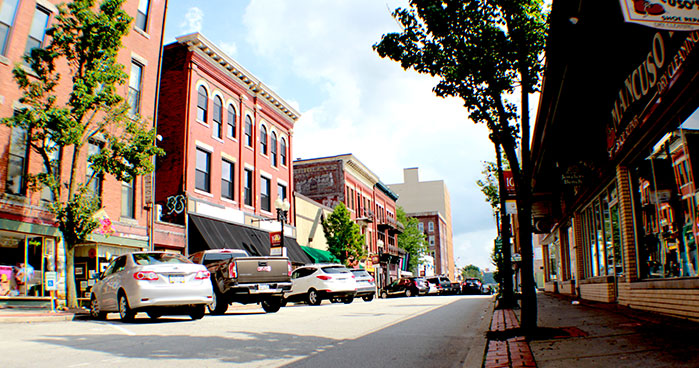
n 2017, the City of Greensburg and the Greensburg Community Development Corporation (GCDC) hired Tripp Umbach, a strategic consulting service, to conduct an updated hotel feasibility study for a potential hotel in downtown Greensburg.
After assessing regional hotel market supply and demand, conducting an analysis of the proposed site, completing interviews with local key business leaders, and completing in-depth research on the local economy, Tripp Umbach developed a report to highlight key findings.
Key Hotel Feasibility Study Findings
Greensburg Community Development Corporation
Ashley Kertes,
Executive Director
Our Address
101 Ehalt Street,
Suite 111
Greensburg, PA 15601
Phone
1. Greensburg’s hotel market is growing but has overlooked downtown
Downtown Greensburg is an emerging cultural and tourist location. There are lodging offerings in the Greensburg region, but not in the downtown core. Investments in attractions such as the renovated Palace Theatre, Westmoreland Museum of American Art, the Seton Hill University Performing Arts Center (opened in 2009) and Arts Center (opened in 2015) have breathed new life into a once sagging downtown corridor. With the nearest hotel 2 miles away from the city core, Greensburg has a need for a true downtown hotel. Tripp Umbach recommend in it’s hotel feasibility study that a small-scale hotel with 60-80 rooms, which should protect itself from market fluctuations of demand.
2. Partnerships with community and regional institutions will ensure the hotel’s success
The Palace Theatre
- Approximately 50% of the 15,000 tickets sold were to patrons outside of Westmoreland County and approximately 10% were to patrons who reside outside of Southwest Pennsylvania and the State of Pennsylvania.
- With a growing reputation and a rejuvenated concert and performance lineup, the theatre will likely continue to attract additional patrons from outside the region and drive the need for a downtown hotel.
Seton Hill University and Pitt Greensburg
- Tripp Umbach estimated that each of these schools – through various needs such as conferences, professor visitations, and other professional matters – would drive demand for a downtown hotel by an additional 25-75 room a year, with an additional 50 or so coming from athletics.
Laurel Highlands Visitors Bureau
- According to a 2016 survey done by Tripp Umbach for the Laurel Highlands Visitors Bureau (LHVB), more than one-third (39%) of survey takers stayed overnight. Additionally, research has found that visitors are willing to spend more ($140-$200) than the daily rate reported by STR Travel Research Firm ($100).
3. Residents and tourists are returning to the city – a national trend recognized by Tripp Umbach.
- It is no secret that the current societal tastes have drawn companies and tourists out of the suburbs and back to cities in recent years. According to the 2013 Census Bureau data, 2.3 million more people were living in metro areas than in 2012, with 269.9 million people now living in cities and their surrounding areas. The shift in population to America’s metro areas has been increasing since 2010, when the American economy began to recover. Companies have also joined the trend – many, both large and small, are looking to move back to urban cores. More business traffic means increased demand for downtown rooms.
- Further, it is important to consider the age of Greensburg citizens. In 2015, the median age of people in Greensburg was 40.6. Compared to 2014, where the average age was 41.2, the residents of Greensburg are getting younger. This is important to note because the return to downtown by millennials and younger citizens is based on a new fondness for service amenities: music venues, theaters, bars, and gyms – services that are growing in downtown Greensburg. From 2000 to 2010, more college educated professionals aged 25 to 34 moved downtown than to the suburbs in 39 of the 50 largest U.S. metro areas.
4. The City of Greensburg has support for a new hotel by local leaders and residents
- Tripp Umbach interviewed 15 key stakeholders and leaders within the Greensburg community. Many felt that downtown Greensburg was ripe for a new hotel due to the expanding arts, cultural, and tourism industries in the city and the region. Many respondents believed that the economy and demographics of the city were trending in the right direction, which should lead to the hotel becoming a success.
In 2017, the City of Greensburg and the Greensburg Community Development Corporation (GCDC) hired Tripp Umbach, a strategic consulting service, to conduct an updated feasibility study for a potential hotel in downtown Greensburg.
After assessing regional hotel market supply and demand, conducting an analysis of the proposed site, completing interviews with local key business leaders, and completing in-depth research on the local economy, Tripp Umbach developed a report to highlight key findings.
Key Findings




Previous
Next

